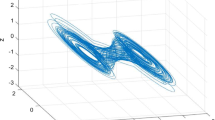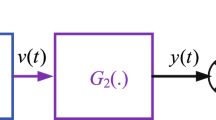Abstract
Parameter adjustment characteristics of linear continuous regulators for nonlinear multiconnected controlled objects whose models belong to the class of state models is analyzed. Regulator adjustment algorithms use the estimates of the parameters of the object. For determining the parameters of an object in this class of systems, there are parametric identification algorithms, which are the generalization of analogous algorithms for linear objects. Local and global, complete and partial adaptability are defined. Criteria for the local and global, complete and partial adaptability are formulated in the form of rank properties of special adaptability matrices. Examples of control systems with local and global, complete and partial adaptability of regulators are given.
Similar content being viewed by others
REFERENCES
Ercberger, H., Analysis and Design of Model Following Systems by State-Space Methods, New York: JACC, 1968.
Zemlyakov, S.D. and Rutkovskii, V.Yu., Functional Controllability and Adjustability of Coordinate-Parametric Control Systems, Avtom. Telemekh., 1986, no. 2, pp. 21-30.
Yadykin, I.B., Adaptability Properties of Linear Regulators, Avtom. Telemekh., 1997, no. 4, pp. 181-191.
Rotach, V.Ya., Avtomatizatsiya nastroiki sistem upravleniya (Automation of Adjustment of Control Systems), Moscow: Energoatomizdat, 1984.
Raibman, N.S. and Chadeev, V.M., Postroenie modelei protsessov proizvodstva (Production Process Models: Their Design), Moscow: Energiya, 1975.
Tsypkin, Ya.Z., Osnovy informatsionnoi teorii identifikatsii (Elements of Information Theory of Identification), Moscow: Nauka, 1991.
Ljung, L., System Identification: Theory for the User, Englewood Cliffs: Prentice Hall, 1987. Translated under the title Identifikatsiya sistem. Teoriya dlya pol'zovatelya, Moscow: Nauka, 1991.
Fomin, V.N., Fradkov, A.L., and Yakubovich, V.A., Adaptivnoe upravlenie dinamicheskimi ob"ektami (Adaptive Control for Dynamic Objects), Moscow: Nauka, 1981.
Kailath, T., Linear Systems, Engelwood Cliff: Prentice-Hall, 1980.
Yadykin, I.B., Adaptability of Regulators and Two-Level Parameter Adjustment Algorithms for Adaptive Control Systems, Avtom. Telemekh., 1983, no. 5, pp. 99-106.
Yadykin, I.B., Regulator Adaptability Criteria for a Class of Nonlinear Objects, SICPRO'2000, Moscow: Inst. Probl. Upravlen., 2000.
Afanas'ev, V.N., Kolmanovskii, V.B., and Nosov, V.R., Matematicheskaya teoriya konstruirovaniya sistem upravleniya (Design of Control Systems: A Mathematical Theory), Moscow: Vysshaya Shkola, 1998.
Paraev, Yu.I. and Perepelkin, E.A., The Concept of a Generalized Transfer Matrix and the Condition of Invariancy of a Linear System, Izv. Ross. Akad. Nauk, Teor. Sist. Upravlen., 1995, no. 6, pp. 66-69.
Bukov, V.N., Kalabukhov, V.S., Maksimenko, I.M., et al., Embedding of Systems, Avtom. Telemekh., 1999, no. 8, pp. 61-73.
Pupkov, K.A., Kapalin, V.P., and Yushchenko, A.S., Funktsional'nye ryady v teorii nelineinykh sistem (Functional Series in the Theory of Nonlinear Systems), Moscow: Nauka, 1976.
Author information
Authors and Affiliations
Rights and permissions
About this article
Cite this article
Morozov, M.V., Yadykin, I.B. Adaptability of Nonlinear Continuous Control Systems. Automation and Remote Control 62, 1881–1889 (2001). https://doi.org/10.1023/A:1012798425462
Issue Date:
DOI: https://doi.org/10.1023/A:1012798425462




